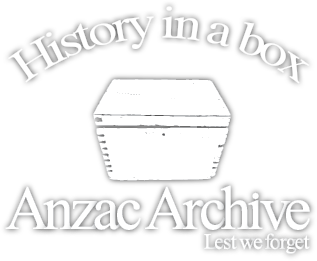About ‘The Box’
The Box
When my mother and father, Lyn and Chris Roberts, retired they moved to Biggenden, 100km west of Bundaberg. Mum’s family were from the region especially around Gayndah. A distant relative, Myrtle Anderson, who lived in Biggenden, asked mum if she would like The Box as it had been found under a bed and was destined for the dump. Mum opened it to discover a collection of World War One memorabilia relating to her great uncles Alban and William Marshal (Jn). It appears that her great grandfather William Marshal (Sn) had gathered into the box many of the letters, postcards, photographs and other memorabilia sent home by his sons while at war. The Box also contains documents and a seaman’s book from William’s (Sn) time in the Qld Navy in the 1880’s to 1890’s. Mum, Lynette Roberts (Nee Ernst), her mother was Nell Ernst (Nee Preston), her mother was Gladys Preston, and Gladys is the sister of Alban and William (Jn), daughter of William Marshal (Sn).
1180 – Private William James Soper Searl Marshall. 25 years old from Wetheron near Gayndah in Qld. In 1915 he enlisted in the 2nd Australian Light Horse Regiment, AIF, 8th Reinforcements.
2115 – Private Alban Edward Sandover Marshall. William’s brother, 29 years old. In 1916 he enlisted in the 42nd Battalion.
Until a year or so ago, I didn’t know these men…these brothers. Their stories had long been lost within their families and their service to their country forgotten over time and generations. I have often thought throughout life about Anzac Day and the significance it holds to Australia and to me. But I had no direct link to WW1, no one from my family had fought in that war and thanks to grandad returning safely from WW2, I had no real concept of what true sacrifice meant or the impact it could have on a family.
This all changed when my mother was given a simple wooden box that had been stored beneath a relative’s bed for years and was now destined for the dump. The box contained nearly 300 items relating to these two men, who turned out to be my mother’s Great Uncles. Suddenly I had a direct link to the Anzacs. Most of the contents had been sent from the war back home: letters, photos, cards, postcards and much more.
Looking through the box is to look into the lives of William and Alban Marshall and their family as they lived through the horror and reality of World War 1. As I looked through the contents the one thing that kept jumping out over and over was not a sense of war, but an overwhelming love of family. Family is what kept the brothers strong on the war front and constant communication from the boys kept their families strong at home. So powerfully the love of family flows through every item sent home. Amidst the blood, gore and destruction of the battlefield, thoughts were constantly for home and family and making sure those at home were reassured of their safety.
These two men, my Great, Great, Uncles have made me look at the reality of war from a much more human and personal perspective, far removed from childlike excitement of weaponry and adventure shared with mates in a foreign land, or standing up for King and Country. It was because of these men that I felt, probably for the first time, a true sense of what sacrifice entails. What the real cost of a war can be to a man and his family.
William served from 1915 to 1918, returning home having been wounded for a second time. William would go on to have a large family and a long life. And he would live on through his children and their children. I have met his great granddaughter who lives in North Queensland. Kathy Hunt also had only just discovered her Great Uncle Alban become aware of her grandfather William’s involvement in the Great War. Like so many returned soldiers, he never spoke of the war. His story was silent.
Alban would never return home. He was killed on the battle field near Yepre in Belguim on May 26, 1917. Alban would never marry…Alban would never have children…Alban would never live out his dreams for life….
This is what those who serve give up, this is how great their sacrifice can be.
I held Alban’s Dog Tags in my hands, I read his Death Commemoration Scroll sent to his parents by the government, and I read what may well be the last letter he sent home to his parents. As a father I could physically sense the loss and sadness that my great, great Grandfather and Grandmother must have felt at the death of their child. My great grandmother Gladys and her brother William at the loss of Alban. It was the love and strength of family that would support them through this loss.
I will never think of war without thinking of the reality of sacrifice, not just from an Australian point of view. All soldiers have family and friends, all who died left behind gaps and holes in the lives of those who loved them that could never be filled. Turk, German, British, American, French, Australian, millions of holes in the lives of millions of families and friends.
I can understand how time can wash away knowledge of individual sacrifice, someone’s life story, lost forever. Before the discovery of The Box, William and Alban had already faded into time.
This is the significance of ANZAC day.
It is not to glorify war…
It is not to celebrate who won or lost…
It is to remember…
To never forget.
For it is only we who are left behind who can ensure that the courage, love and sacrifice of those who endure and live through war is never forgotten.
Mark Roberts
